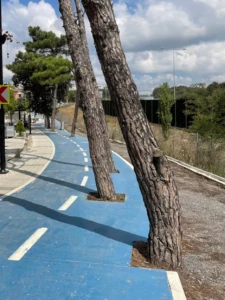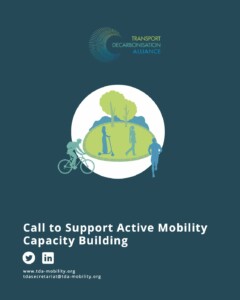Cycling infrastructure / Mobility
Why we are going to COP27
Mobycon is going to the COP27 conference! In my role as chair of the community of interest on active mobility for the Transport Decarbonization Alliance (TDA), I will be attending the COP27 conference in Egypt next week. Flying to Egypt for a conference is not a decision I take lightly. It is, however, for an important cause.
In the last few months, we’ve been working together with the TDA to write a call to support. The outcome is an open letter, calling on the participants of COP27 to invest more in capacity building for walking and cycling. We have done this for a very important reason: As more cities and governments increase their investment in cycling infrastructure, we foresee a new bottleneck. Existing active mobility departments that have been working with small budgets suddenly have to increase the delivery of projects substantially (sometimes by a factor 10). That requires a lot of people, project managers, engineers, contractors, that know how to design, build, maintain, and operate walking and cycling infrastructure. Those people don’t exist yet.
This means that a lot of cycling facilities are designed by people that are not experienced in the topic, resulting in outcomes like this:

(Credit: http://ow.ly/eEBn50Lull9 )
Poorly designed and planned infrastructure can lead to a negative feedback loop of people seeing under-used cycleways and considering the investment a waste of money.
To counter this process, enable more cities to create high quality networks and facilities, and to make sure everybody has unencumbered access to global best practice knowledge, the TDA proposes an investment of $100-million in capacity building for walking and cycling over the next 10 years.
With that money, we can train 10 000 professionals worldwide in the planning, design, operations, and promotion of waking and cycling. By creating high quality active mobility networks and facilities, we can facilitate a positive feedback loop where more local knowledge leads to better facilities, which in turn leads to more investment in sustainable transportation.
This call to action is already supported by the Dutch Ministry for Transport, the World Resource Institute, UN Environment Programme, POLIS and the Dutch Cycling Embassy. By travelling to COP27, I am aiming to find more cities and organisations that would benefit from a global capacity building programme, and to find funding partners that can help us make this initiative a reality. We see it as an amazing opportunity for every city worldwide to create a local knowledge base on walking and cycling, resulting in high quality, safe, usable, and comfortable networks for sustainable mobility.
Are you going to COP27? If so, please send an email here so we can connect.
If you want to sign the call to support, it is not too late! Click here to show your support!

 ">
">Lennart Nout
‘The interplay of different modalities within cities intrigues me. I am always looking for the best solution for the city and its inhabitants, while playing close attention to bikes. In the Netherlands and abroad I give workshops on the development of cycling culture, strategic network planning, street design and intersection design.’

